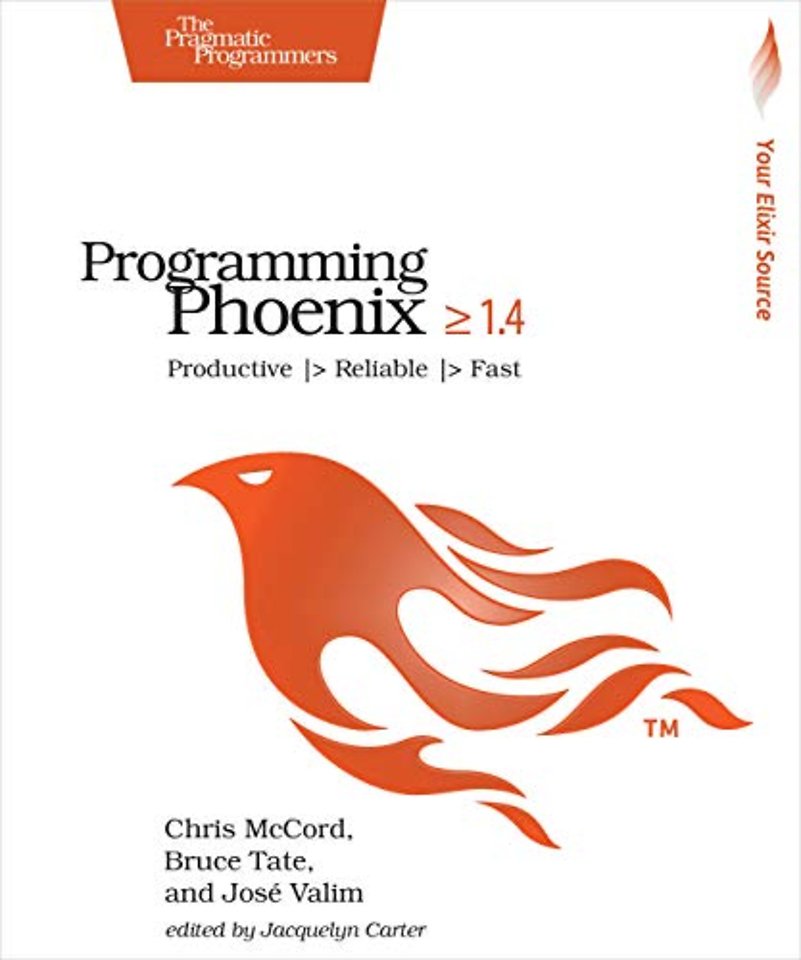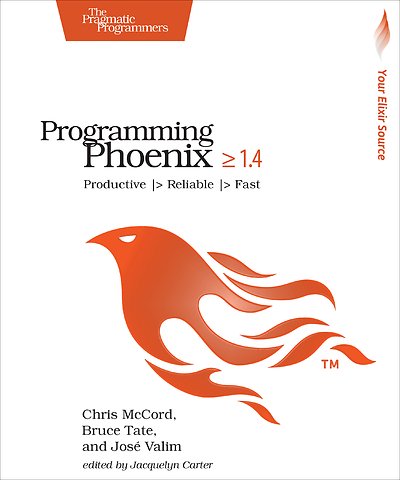Programming Phoenix 1.4
Productive |> Reliable |> Fast
Paperback Engels 2019 1e druk 9781680502268Samenvatting
Phoenix is the long-awaited web framework based on Elixir, the highly concurrent language that combines a beautiful syntax with rich metaprogramming. The best way to learn Phoenix is to code, and you’ll get to attack some interesting problems. Start working with controllers, views, and templates within the first few pages. Build an in-memory context, and then back it with an Ecto database layer, complete with changesets and constraints that keep readers informed and your database integrity intact. Craft your own interactive application based on the channels API for the real-time applications that this ecosystem made famous. Write your own authentication plugs, and use the OTP layer for supervised services. Organize code with modular umbrella projects.
This edition is fully updated for Phoenix 1.4, with a new section on using Channel Presence to find out who’s connected, even on a distributed application. Use the new generators and the new ExUnit features to organize tests and make Ecto tests concurrent.
This is a book by developers and for developers, and we know how to help you ramp up quickly. Any book can tell you what to do. When you’ve finished this one, you’ll also know why to do it.
Specificaties
Lezersrecensies
Over José Valim
Inhoudsopgave
Introduction
Building with Functional MVC
The Lay of the Land
-Simple Functions
-Installing Your Development Environment
-Creating a Throwaway Project
-Building a Feature excerpt
-Going Deeper: The Request Pipeline
-Wrapping Up
Controllers
-Understanding Controllers
-Building a Controller
-Coding Views
-Using Helpers
-Showing a User
-Wrapping Up
Ecto and Changesets
-Understanding Ecto
-Defining the User Schema and Migration
-Using the Repository to Add Data
-Building Forms
-Creating Resources
-Wrapping Up
Authenticating Users
-Preparing for Authentication
-Managing Registration Changesets
-Creating Users
-The Anatomy of a Plug excerpt
-Writing an Authentication Plug
-Implementing Login and Logout
-Presenting User Account Links
-Wrapping Up
Generators and Relationships
-Using Generators
-Building Relationships
-Managing Related Data
-In-context Relationships
-Wrapping Up
Ecto Queries and Constraints excerpt
-Seeding and Associating Categories
-Diving Deeper into Ecto Queries
-Constraints
-Wrapping Up
Testing MVC
-Understanding ExUnit
-Testing Contexts
-Using Ecto Sandbox for Test Isolation and Concurrency
-Integration Tests
-Unit-Testing Plugs
-Testing Views and Templates
-Wrapping Up
Writing Interactive and Maintainable Applications
Watching Videos
-Watching Videos
-Adding JavaScript
-Creating Slugs
-Wrapping Up
Using Channels
-The Channel
-Phoenix Clients with ES6
-Preparing Our Server for the Channel
-Creating the Channel
-Sending and Receiving Events
-Socket Authentication
-Persisting Annotations
-Handling Disconnects
-Tracking Presence on a Channel
-Wrapping Up
Observer and Umbrellas
-Introspecting Applications with Observer
-Using Umbrellas
-Extracting Rumbl and RumblWeb
-Wrapping Up
OTP
-Managing State with Processes
-Building GenServers for OTP
-Designing an Information System with OTP
-Building the Wolfram Info System
-Integrating OTP Services with Channels
-Wrapping Up
Testing Channels and OTP
-Testing the Information System
-Isolating Wolfram
-Adding Tests to Channels
-Authenticating a Test Socket
-Communicating with a Test Channel
-Wrapping Up
What’s Next?
-Other Interesting Features
-Phoenix LiveView
-Phoenix PubSub 2.0
-Phoenix and Telemetry Integration
-Good Luck!
Anderen die dit boek kochten, kochten ook
Rubrieken
- advisering
- algemeen management
- coaching en trainen
- communicatie en media
- economie
- financieel management
- inkoop en logistiek
- internet en social media
- it-management / ict
- juridisch
- leiderschap
- marketing
- mens en maatschappij
- non-profit
- ondernemen
- organisatiekunde
- personal finance
- personeelsmanagement
- persoonlijke effectiviteit
- projectmanagement
- psychologie
- reclame en verkoop
- strategisch management
- verandermanagement
- werk en loopbaan








